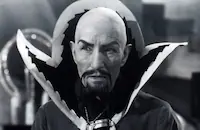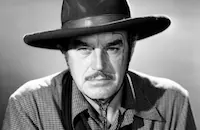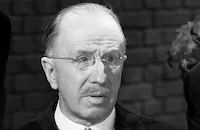Palmy Days
Brief Synopsis
Cast & Crew
Edward Sutherland
Charlotte Greenwood
Barbara Weeks
Spencer Charters
Paul Page
Charles Middleton
Film Details
Technical Specs

Synopsis
When Helen Martin, the fitness instructor for the women workers at A. B. Clark's bakery, asks fake mystic Yolando for advice about love, Yolando promises that the man of her dreams will appear that day at eleven o'clock. The fraudulent medium then orders his browbeaten assistant, Eddie Simpson, to romance Helen. While Eddie is trying to dissuade Helen from an immediate marriage, Clark also consults Yolando and is told that a man who will build his business will arrive in his office at noon. After Clark leaves, Yolando sends his henchman, Joe-the-Frog, to impersonate a mysterious efficiency expert so that they can swindle Clark out of his money. Their plan is foiled, however, when Eddie arrives in Clark's office first while escaping from Helen. Eddie's zaniness appeals to Clark, and Clark hires him as an efficiency expert. Eddie is thrilled with this unexpected chance to go straight and after accepting the job, becomes infatuated with Clark's daughter Joan, who is in love with Steve Clayton, one of Clark's managers. Later that day, Yolando discovers that Eddie was hired instead of Joe and threatens to kill Eddie if he does not go along with the scheme. Hoping to convince Yolando to leave him alone, Eddie impersonates a French mindreader, Professor Ledoux, and tells Yolando to stop terrorizing the young man in his employ. Yolando sees through the disguise, however, when Eddie's excitement causes him to sing, a trait that has plagued Eddie all his life. Eddie is saved from a beating when Clark arrives for a reading, and the two leave together. As time passes, Eddie builds up business in Clark's bakery cafe by singing, and while Helen falls more in love with him, he becomes convinced that Joan returns his affections. One afternoon, Clark reveals to Eddie that he is going to announce Joan's engagement at a party that evening, and although Joan's intended is Steve, Eddie assumes that Clark is referring to him. Clark also gives Eddie $25,000 for safekeeping, but Yolando spots it, and Eddie puts the money in Clark's safe. When Joe and Yolando's other henchman, Plug Moynihan, try to get the safe's combination from Eddie, he is forced to take refuge in the girl's locker room and swimming pool until he hides the money by baking it in a loaf of bread. Eddie goes to Clark's party with the bread and is enjoying the festivities when a report arrives that the money has been stolen. Eddie tries to explain, but when he tears open the bread, there is no money inside. A police officer takes Eddie away, but Helen accompanies him, and the couple outwit the policeman and go to the bakery to find the bread. They run into Yolando and his men after finding the money, but are able to convince Clark over the telephone that Yolando has been playing him for a sucker. After Eddie and Helen battle with the crooks, the police arrive and make their arrest. The couple return to the party, where Eddie informs Clark that he loves Helen and cannot marry Joan, after which Helen finally gets Eddie to sing "yes, yes" in front of a judge.

Director
Edward Sutherland
Cast

Charlotte Greenwood
Barbara Weeks
Spencer Charters
Paul Page

Charles Middleton

George Raft

Harry Woods

Eddie Cantor

Arthur Hoyt
Olive Hatch
Georgia Coleman
Dorothy Poynton
Crew
Harry Akst
Busby Berkeley
Eddie Cantor
Eddie Cantor
Mlle. Gabrielle Chanel
Con Conrad
Benny Davis
Richard Day
David Freedman
Cliff Friend
Samuel Goldwyn
Stuart Heisler
Ballard Macdonald
Alfred Newman
Alfred Newman
Alice O'neill
Willy Pogany
Morrie Ryskind
Morrie Ryskind
Dave Silverstein
Edward Sutherland
Keene Thompson
Sherman Todd
Gregg Toland
Vinton Vernon

Film Details
Technical Specs

Quotes
Trivia
Some sources also list Virginia Bruce and Ruth Etting as Goldwyn Girls, but they are probably wrong.
Walter Catlett was hired for some comical scenes, but he didn't made it in the final print.
Notes
Although Eddie Cantor is listed above the title, he is placed at the end of the "Player's" list. A pre-production article in New York Times mentions that Betty Grable was being considered for the ingenue part, and modern sources include her in the cast as one of the Goldwyn Girls dancers. The New York Times article also includes Guy Bolton and Ray Harris in a list of writers working with Eddie Cantor on the film's script, but their contribution to the completed picture, if any, has not been determined. Although several reviews and the film's pressbook include Walter Catlett in the cast in "a comedy bit," his participation in the completed film has not been confirmed. The Variety review asked: "Where was Walter Catlett...? He went unnoticed in the picture if there." According to the pressbook, Cantor researched the topic of fraudulent mediums by visiting "numerous fortune tellers in New York, Los Angeles and other cities, gathering together actual instances exposed by the late Houdini." A New York Times article reported that after the film had its preview, producer Samuel Goldwyn decided to include more songs, and "the result was that much of the story was excluded and, at a cost of $75,000, more songs were added." Cantor made a personal appearance at the film's opening in New York, and a Hollywood Reporter news item noted that Groucho Marx was also there and "interrupted Cantor so much Eddie had to chase him from the stage." The song "Goose Pimples," written by Cantor, Benny Davis and Harry Akst, was not in the print viewed, but is listed in the film's pressbook and the music copyright records for the picture. This was the first of many Goldwyn films for which Mlle. Gabrielle Chanel designed the gowns. In a modern interview, dance director Busby Berkeley states that he made his first screen appearance in Palmy Days as a fortune teller. Modern sources claim that the Goldwyn Girls appear in the production and list the following dancers as members: Loretta Andrews, Edna Callahan, Nadine Dore, Amo Ingraham, Jean Lenivick, Betty Lorraine, Fay Pierre, Hylah Slocum, Betty Stockton, Nita Pike, Nancy Nash, Neva Lynn, Virginia Grey, Virginia Bruce and Hazel Witter.












